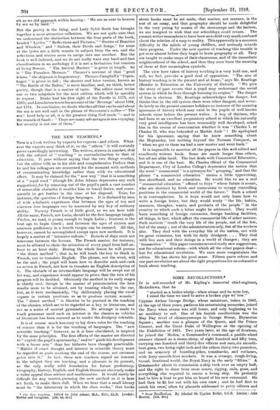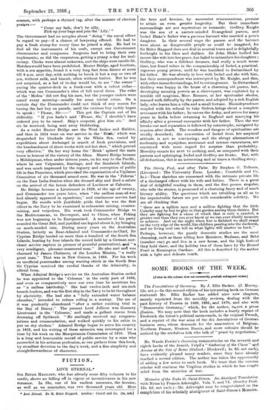SOME RECOLLECTIONS.* IT is self-recorded of Mr. Kipling's immortal chief-engineer,
McAndrews, that he "started as a boiler-whelp—when steam and he were low, I mind the time we used to serve a broken pipe wi' tow."
Cyprian Arthur George Bridge, whose miniature, taken in 1842, at the age of three years, paefaces his entertaining memories, joined the Navy when steam was still lower, and only beginning to be an auxiliary to sail. One of his boyish recollections was the May Day revel of chimneysweeps in George Street, Bryanston Square ; another was a glimpse of the Queen, and the Prince Consort, and the Great Duke of Wellington at the opening of the Exhibition of 1851. Two years later, at the age of fourteen, he joined the 'Medea,' a Commander's command, a paddle-wheel steamer classed as a steam-sloop, of eight hundred and fifty tons, carrying one hundred and thirty-five officers and men, six smooth- bore guns, two being eight-inch and the others thirty-two pounders, and an armoury of boarding-pikes, tomahawks, and cutlasses, with forty smooth-bore muskets. It was a strange, rough-living, casual, frrational world, the Royal Navy in the early "fifties." A Commander about to commission a ship took over an empty hull, and the right to draw from store masts, rigging, sails, guns, and everything else required to create a living ship. He probably had to hire a boat to put him on board of his new command. He had then to fit her out with his own crew ; and he had first to catch his crew; often by placards addressed to petty officers and • sons. ReaRectIons. By Admiral Sir Cyprian Bridge, G.C.B. London : John Murray, 112a. net.)
seamen, with perhaps a rhymed tag, after the posters
:-
"Come my lads, don't be silly, • Pick up your bags and join the' Lily.'"
The Government had no scruples about " doing " the naval officer in regard to pay—if a chance. of lawyering offered. He had to pay a fresh stamp-fee every time he joined a ship. He had to find all the instruments of his craft, except one Government chronometer and compasses. Surgeons had to bring their own implements; so did the carpenters, getting a penny a day for tool- money. Clocks were almost unknown, and the ships were candle-lit. Matches would have been prohibited. Master Bridge, aged fourteen, with a sea appetite, found it a very long fast from dinner at noon till 8 a.m. next day, with nothing to break it but a cup or two of Lea, without milk, and biscuit, often without butter. But he WAS not surprised, as a lad of to-day would be, to see "the owner" pacing the quarter-deck in a frock-coat with a velvet collar— which was one Commander's idea of full naval dress. The ruler of the 'Medea' did not flog his men, but the younger cadets were caned every morning—usually for some trivial crime. On a certain day the Commander could not think of any reason for caning the last boy on parade, until the anxious boy rashly began
to speak "Please, This got the Captain out of his difficulty. "If you hadn't said Please, Sir,' I shouldn't have ordered you to be caned. Ship's corporal, give him six." And six he received, being sent away blubbering.
As a cadet Master Bridge saw the West Indies and Halifax, and then in 1854 went on war service in the Briek,' which was despatched for blockade duty in the White Sea, varied by expeditions about Archangel in seorch of fresh provisions, and the bombardment of shore works with red-hot shot," which proved very effective." On her way home the Brisk' spliced the main brace in honour of the victory of the Alma. Master Bridge became a Midshipman, when under sixteen years, on his way to the Pacific, where he saw Valparaiso, Santiago, and the Sandwich Islands, and was much impressed by the roguery and corruption of public life in San Francisco, which provoked the organization of a Vigilance Committee of six thousand armed men. He was in the Pelorus ' on the East India Station when she dressed ship and fired a salute on the arrival of the heroic defenders of Lucknow at Calcutta.
Mr. Bridge became a Lieutenant in 1859, at the age of twenty, and Commander ten years later, when "the selfless man-of-war had already appeared in squadrons," and continuous service had begun. He recalls with luatifia.ble pride that he was the first officer in the Navy to be examined in submarine mining, counter- mining, and torpedoes. His work took Commander Bridge to the Mediterranean, to Devonport, and to China, when Peking was not beginning to be Europeanized A member of his party sounded the Great Bell, and justified one legend about it, by bringing on much-needed rain. During many years on the Australian Station, latterly as Rear-Admiral and Commander-in-Chief, Sir Cyprian Bridge landed on more than a hundred of the South Sea Islands, beating by four islands the record held by a German mer- chant service captain (a pioneer of peaceful penetration), and "a very intelligent, pleasant-mannered man." He also met and was charmed by James Chalmers, of the London Mission, "a really great man." That was in New Guinea, in 1884. For his work as unofficial peacemaker among warring chiefs in the South Seas Sir Cyprian received the cordial thanks of the Admiralty, in official form.
When Admiral Bridge's service on the Australian Station ended
he was appointed to the Colossus ' in the early part of 1886, and even so comparatively near our own time he mentions her as"a sailless battleship." She had twelve-inch and six-inch breech-loaders, and was the first ship in the Navy to be lit throughout by electricity. She had also a "fully extended water balance
chamber," intended to reduce rolling in a seaway. The use of it was prudently abandoned "after a rather exciting trial in the Bay of Biscay." The present Lord Jellicoe was Gunnery Lieutenant in the Colossus,' and made a gallant rescue from drowning off 8pithead. "He smilingly received my congratu- lations and commendation, and walked quickly to his cabin to put on dry clothes." Admiral Bridge began to serve his country in 1853, and his writing of these memoirs was interrupted for a time by his work on the Mesopotamia Commission of 1916. That is a long and honourable record of public service by a man who succeeded in his arduous profession, as one gathers from this book, by steadfast devotion to the day's work, and a fine simplicity and straightforwardness of character.



































 Previous page
Previous page